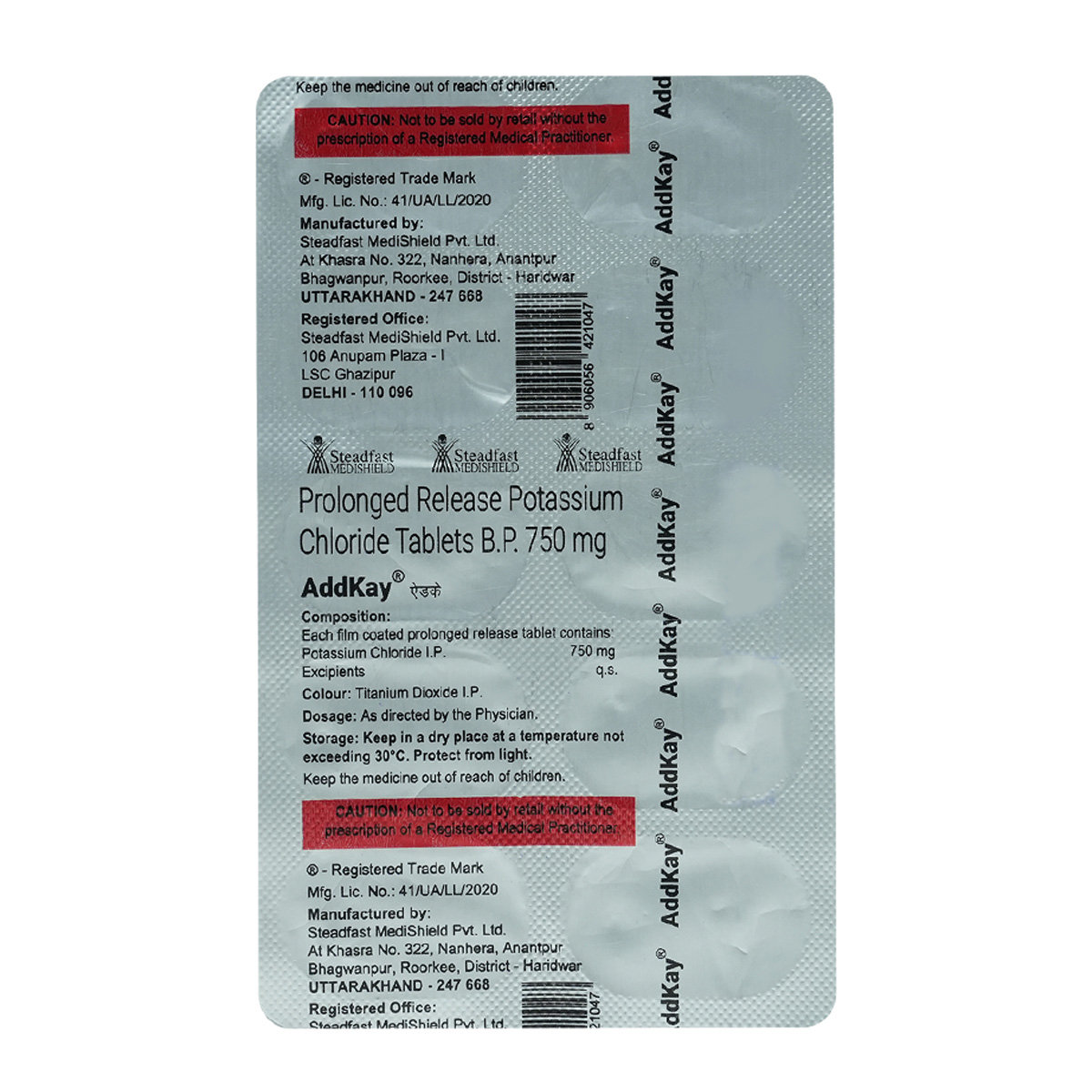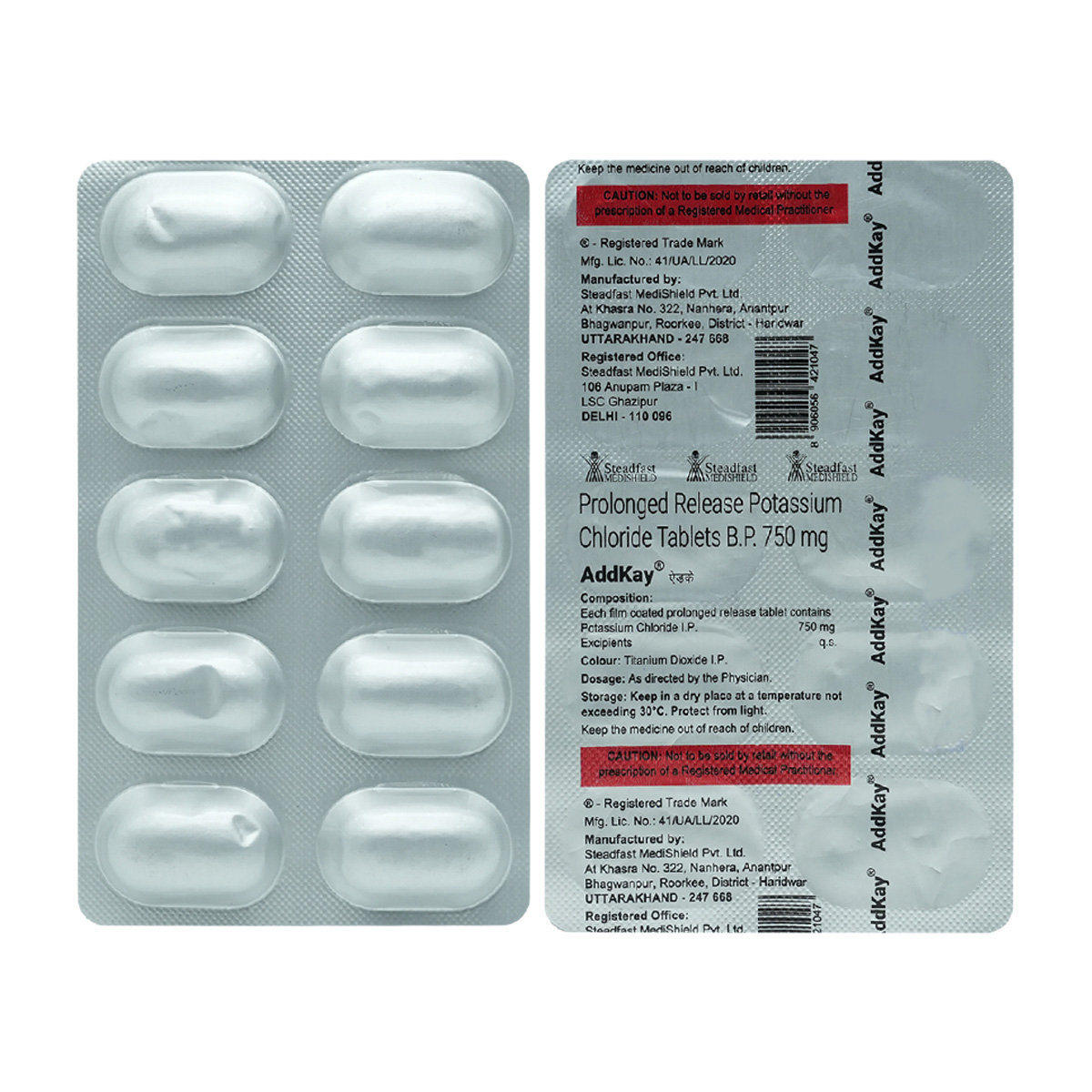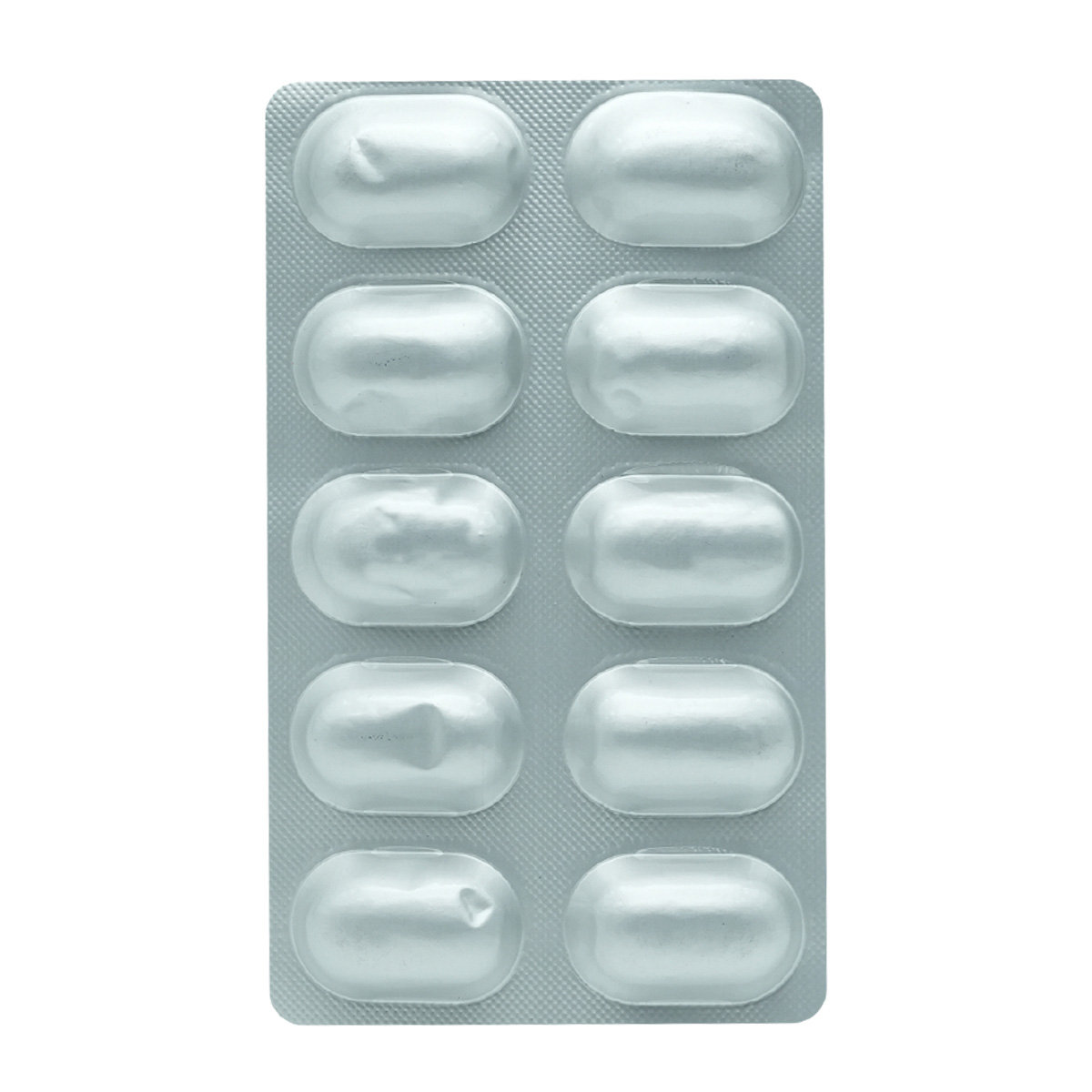Addkay Tablet 10's
MRP ₹93.5
(Inclusive of all Taxes)
₹14.0 Cashback (15%)
Provide Delivery Location
Online payment accepted
 Prescription drug
Prescription drugWhats That
Composition :
Manufacturer/Marketer :
Consume Type :
Expires on or after :
Return Policy :
About Addkay Tablet
Addkay Tablet is indicated in the prevention and treatment of hypokalaemia (low potassium) with or without metabolic acidosis (build-up of acid in the blood), in familial periodic paralysis (inherited neurological disorder) and digitalis intoxication.
Addkay Tablet contains ‘Potassium chloride’, which works by replenishing the potassium, thereby treating hypokalaemia.
Addkay Tablet can cause some side effects, such as diarrhoea, abdominal pain/discomfort, flatulence, nausea, and vomiting. Most of these side effects do not require medical attention and will resolve gradually over time. However, you are advised to talk to your doctor if the side effects persist or worsen.
Avoid concomitant use of potassium-sparing diuretics (e.g., spironolactone, triamterene or amiloride) with Addkay Tablet as it may cause hyperkalaemia (high potassium levels). Consult a doctor if you are pregnant or breastfeeding. Keep your doctor informed about your health condition and medicines to rule out any side effects/interactions.
Uses of Addkay Tablet
Directions for Use
Key Benefits
Addkay Tablet is indicated in the prophylaxis and treatment of hypokalaemia (low potassium) in familial periodic paralysis (inherited neurological disorder), digitalis intoxication, with or without metabolic acidosis (build-up of acid in the blood), in patients for whom diuretic dose reduction or dietary management with potassium-rich foods are insufficient. Addkay Tablet contains ‘Potassium chloride’, which works by replenishing the potassium, thereby treating hypokalaemia.
Storage
- Inform your doctor about the nausea and discuss possible alternatives to the medication or adjustments to the dosage.
- Divide your daily food intake into smaller, more frequent meals to reduce nausea.
- Opt for bland, easily digestible foods like crackers, toast, plain rice, bananas, and applesauce.
- Avoid certain foods that can trigger nausea, such as fatty, greasy, spicy, and smelly foods.
- Drink plenty of fluids, such as water, clear broth, or electrolyte-rich beverages like coconut water or sports drinks.
- Use ginger (tea, ale, or candies) to help relieve nausea.
- Get adequate rest and also avoid strenuous activities that can worsen nausea.
- Talk to your doctor about taking anti-nausea medication if your nausea is severe.
- Record when your nausea occurs, what triggers it, and what provides relief to help you identify patterns and manage your symptoms more effectively.
- Preventing Vomiting (Before it Happens)
- Take medication exactly as prescribed by your doctor. This can help minimize side effects, including vomiting.
- Having a small meal before taking your medication can help reduce nausea and vomiting.
- Talk to your doctor about taking anti-nausea medication along with your prescribed medication.
- Managing Vomiting (If it Happens)
- Try taking ginger in the form of tea, ale, or candy to help alleviate nausea and vomiting.
- What to Do if Vomiting Persists
- Consult your doctor if vomiting continues or worsens, consult the doctor for guidance on adjusting your medication or additional treatment.
Drug Warnings
Do not take Addkay Tablet if you are allergic to any of its components. Inform your doctor if you have hyperkalaemia (high potassium levels), kidney disease, liver cirrhosis, adrenal gland disorder, severe burn, severe dehydration, diabetes, heart disease, high blood pressure, stomach or intestinal bleeding, blockage in stomach or intestine, chronic diarrhoea or if you are taking potassium-sparing diuretics. Consult your doctor if you are pregnant or breastfeeding.
Drug-Drug Interactions
Drug-Drug Interactions
Login/Sign Up
Taking Mepenzolate and Addkay Tablet(in tablet or capsule form) together can increase the risk of stomach ulcers, bleeding, and other gastrointestinal injury.
How to manage the interaction:
Taking Mepenzolate with Addkay Tablet is not recommended, as it can lead to an interaction, it can be taken if a doctor has prescribed it. However, if you experience severe stomach pain, bloating, sudden lightheadedness or dizziness, nausea, vomiting (especially with blood), decreased hunger, dark, tarry stools, consult the doctor immediately.
Taking Cyproheptadine with Addkay Tablet can increase the risk of stomach ulcers.
How to manage the interaction:
Taking Cyproheptadine with Addkay Tablet is not recommended, as it can lead to an interaction, can be taken if your doctor has prescribed it. However, if you experience severe stomach pain, bloating, sudden lightheadedness or dizziness, nausea, vomiting (especially with blood), decreased hunger, dark, tarry stools, consult the doctor immediately. Do not stop any medication without talking to a doctor.
Taking Difenoxin and Addkay Tablet (in tablet or capsule form) together can increase the risk of stomach ulcers, bleeding, and other gastrointestinal injury.
How to manage the interaction:
Taking Difenoxin with Addkay Tablet is not recommended, as it can lead to an interaction, it can be taken if a doctor has prescribed it. However, if you experience severe stomach pain, bloating, sudden lightheadedness or dizziness, nausea, vomiting (especially with blood), decreased hunger, dark, tarry stools, consult the doctor immediately.
Taking Procyclidine and Addkay Tablet together can increase the risk of stomach ulcers.
How to manage the interaction:
Taking Procyclidine with Addkay Tablet is not recommended, but it can be taken together if advised by a doctor. However, if you experience severe stomach pain, bloating, sudden lightheadedness or dizziness, nausea, vomiting (especially with blood), decreased hunger, or dark, tarry stools, consult the doctor immediately. Do not discontinue any medications without a doctor's advice.
Taking Doxepin with Addkay Tablet can increase the risk of stomach ulcers.
How to manage the interaction:
Taking Doxepin with Addkay Tablet is not recommended, as it can lead to an interaction, but it can be taken if a doctor has prescribed it. However, if you experience severe stomach pain, bloating, sudden lightheadedness or dizziness, nausea, vomiting (especially with blood), loss of appetite, or dark, tarry stools, consult the doctor immediately. Do not discontinue any medications without a doctor's advice.
Taking Tolterodine and Addkay Tablet together can increase the risk of side effects.
How to manage the interaction:
Although there is an interaction between Tolterodine and Addkay Tablet, they can be taken if prescribed by a doctor. However, contact a doctor immediately if you develop severe abdominal pain, bloating, sudden dizziness or lightheadedness, nausea, vomiting (especially with blood), or less desire to eat. Do not discontinue medications without consulting a doctor.
Co-administration of Flavoxate with Addkay Tablet can increase the risk of stomach ulcers.
How to manage the interaction:
Taking Flavoxate with Addkay Tablet is not recommended, as it can lead to an interaction, it can be taken if a doctor has prescribed it. However, if you experience severe stomach pain, bloating, sudden lightheadedness or dizziness, nausea, vomiting (especially with blood), decreased hunger, or dark, tarry stools, consult the doctor immediately. Do not discontinue the medication without consulting a doctor.
Co-administration of Dimenhydrinate and Addkay Tablet can increase the risk of stomach inflammation.
How to manage the interaction:
Co-administration of Dimenhydrinate with Addkay Tablet is generally not recommended, as it can lead to an interaction, it can be taken when a doctor has prescribed it. However, if you experience severe stomach pain, sudden dizziness, vomiting (especially with blood), or dark stools, consult the doctor immediately. Do not discontinue any medications without a doctor's advice.
The combination of Amitriptyline and Addkay Tablet may cause stomach and upper intestinal discomfort. (Only applicable to an oral preparation)
How to manage the interaction:
Although co-administration of Amitriptyline and Addkay Tablet is not recommended as it can possibly lead to an interaction, they can be taken if prescribed by a doctor. If you experience severe stomach pain, bloating, sudden dizziness or lightheadedness, nausea, vomiting (in particular with blood), decreased hunger, and black stools while taking these medications, consult a doctor immediately. Do not discontinue any medications without talking to a doctor.
Taking Addkay Tablet with clidinium bromide may increase the risk of irritant effects of potassium on your stomach and upper intestine.
How to manage the interaction:
Co-administration of Addkay Tablet with clidinium bromide is not recommended, it can be taken if prescribed by the doctor. However, if you experience symptoms such as severe stomach pain, bloating, sudden dizziness or lightheadedness, nausea, vomiting (especially with blood), decreased hunger, black, tarry stools, consult the doctor immediately. Do not discontinue any medications without consulting a doctor.
Drug-Food Interactions
Drug-Food Interactions
Login/Sign Up
Diet & Lifestyle Advise
- Follow a well-balanced diet.
- Exercising regularly helps in improving overall health.
- Rest well, and get plenty of sleep.
- Avoid smoking and alcohol consumption.
- Meditation and yoga can help lower stress.
- Avoid processed and fried food.
Side Effects of Addkay Tablet
- Abdominal pain/discomfort
- Nausea
- Vomiting
- Diarrhoea
- Flatulence
Habit Forming
Therapeutic Class
All Substitutes & Brand Comparisons
RX
Out of StockKcl Plus Tablet 10's
Delvin Formulations (P) Ltd
₹100
(₹9.0 per unit)
6% COSTLIERRX
Potride 750 mg Tablet 10's
Mediart Life Sciences Pvt Ltd
₹101
(₹9.09 per unit)
7% COSTLIER
Author Details
We provide you with authentic, trustworthy and relevant information
Drug-Diseases Interactions
Drug-Diseases Interactions
Login/Sign Up
FAQs
Addkay Tablet works by replenishing the potassium, thereby treating hypokalaemia.
Please consult your doctor before taking potassium supplements or products that contain potassium, salt substitutes or low-salt dietary products with Addkay Tablet , as it may lead to high potassium levels.
To treat your condition effectually, continue taking Addkay Tablet for as long as your doctor has prescribed it. Do not be reluctant to speak with your doctor if you experience any difficulty whilst taking Addkay Tablet .
Special Advise
Your doctor may recommend regular blood tests and ECG monitoring to check heart rate.
Disease/Condition Glossary
Hypokalaemia (low potassium): It is a condition in which the serum concentration of potassium is below normal. Inadequate dietary intake of potassium, chronic kidney disease, use of medication (such as diuretics or antibiotics), and loss of gastrointestinal fluids through diarrhoea, vomiting or laxative use could be the causes of hypokalaemia. Symptoms include weakness, muscle pain, constipation, palpitations, tingling or numbness.

Have a query?
Alcohol
Safe if prescribed
It is unknown if alcohol interacts with Addkay Tablet . Please consult your doctor.
Pregnancy
Consult your doctor
Please consult your doctor if you are pregnant. Your doctor will prescribe only if the benefits outweigh the risks.
Breast Feeding
Consult your doctor
Please consult your doctor if you are breastfeeding. Your doctor will decide whether breastfeeding women can take Addkay Tablet or not.
Driving
Safe if prescribed
It is not known if Addkay Tablet alters your ability to drive. Drive or handle machinery only if you are alert.
Liver
Consult your doctor
Please consult your doctor if you have a liver impairment or any concerns regarding this.
Kidney
Consult your doctor
Please consult your doctor if you have kidney impairment or any concerns regarding this.
Children
Safe if prescribed
Please consult your doctor. Your doctor will decide the dose of Addkay Tablet depending on the age and body weight of your child.











_0.jpg?tr=q-85)

